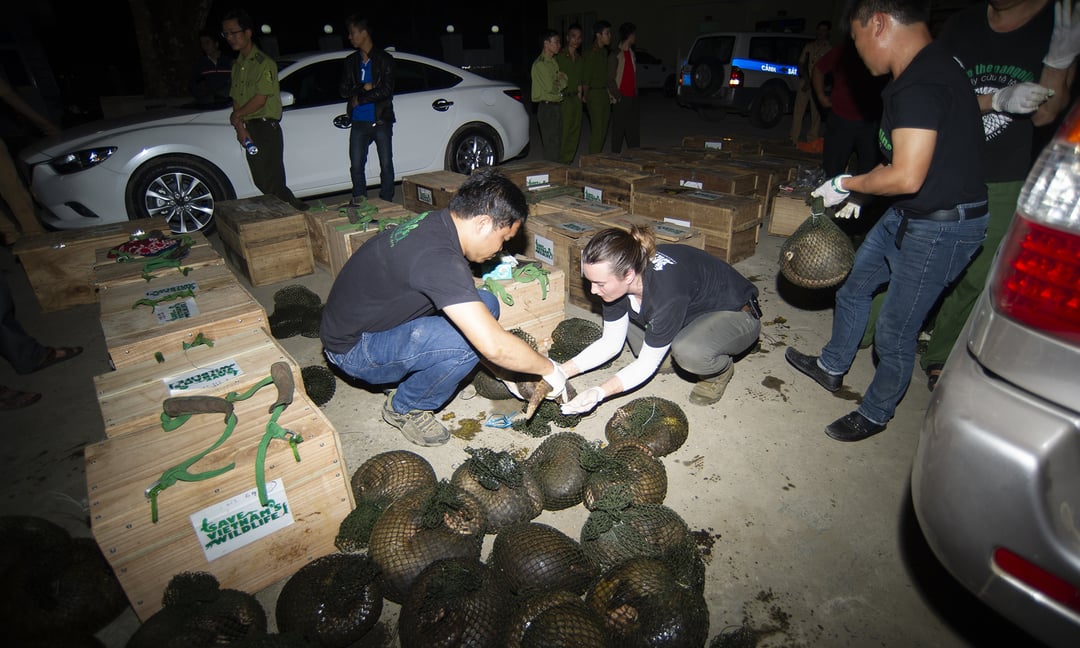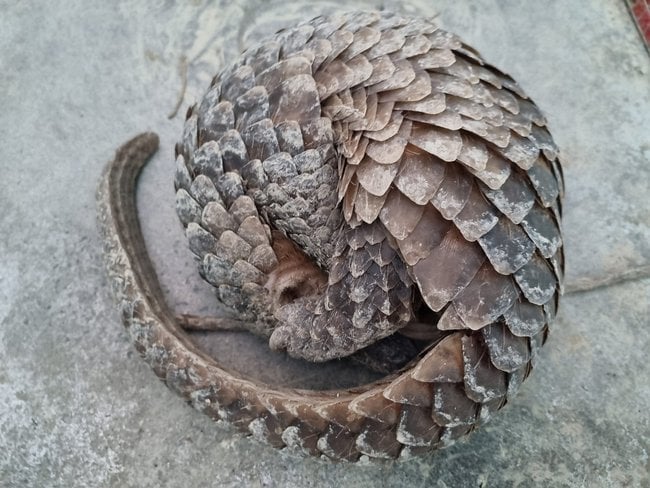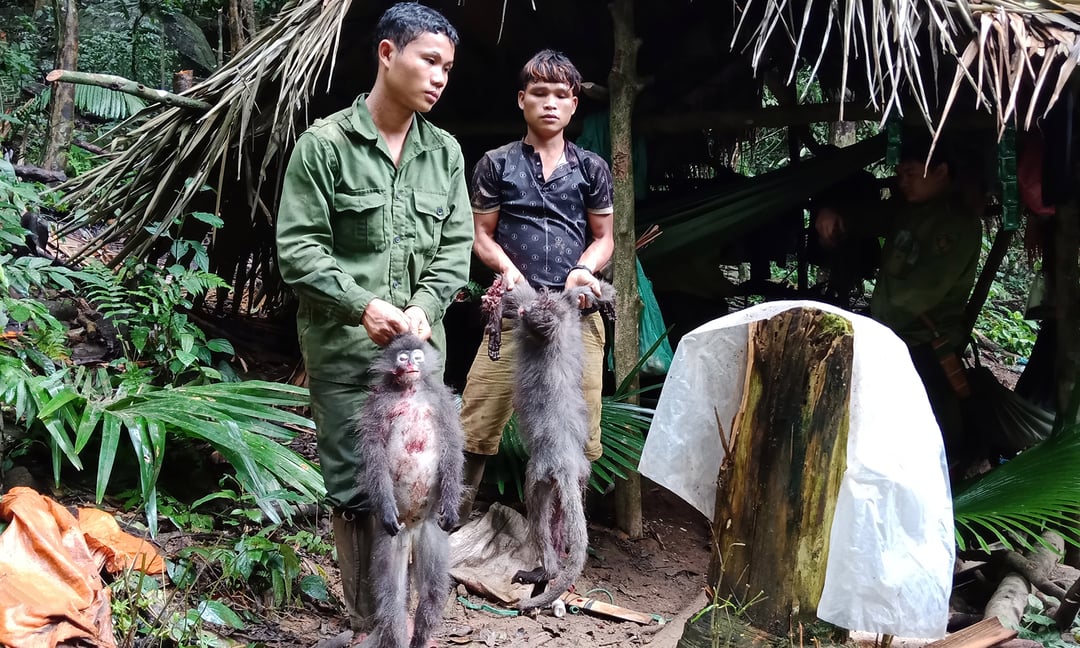May 29, 2025 | 15:51 GMT +7
May 29, 2025 | 15:51 GMT +7
Hotline: 0913.378.918
May 29, 2025 | 15:51 GMT +7
Hotline: 0913.378.918
The Forest Protection Department of the city of Hue (Thua Thien- Hue) informed on October 17 that it had received a manis javanica weighing 1.5 kilos that had been captured in a resident's garden. This endangered group of IB forest animals is extremely rare.
The Department, in partnership with the Center for the Rescue, Conservation, and Development of Creatures, returned the manis javanica into the wild after establishing the ownership rights of the public through documentation (Bach Ma National Park).

The wildlife trade is estimated to bring in as much as VND 20 billion annually.
According to the World Wild Fund for Nature (WWF), the pangolin is one of the endangered animals in Vietnam, along with Asian rhinos, elephants, and big cats. Not all wild creatures, however, are as fortunate as the manis javanica in Thua Thien - Hue.
According to WWF's Planetary Vitality Report 2022, every 10 populations of mammals, birds, amphibians, reptiles, and fish have reduced to 3 from 1970 to the present. In addition to habitat loss, the introduction of invasive species, pollution, climate change, and diseases, the organization identifies "exploitation and consumption" as one of the leading causes of the decrease.
Wild animal exploitation and consumption include hunting, trading, transportation, raising, slaughtering, and consumption. Each link in this chain poses a risk of the emergence and transmission of infectious pathogens from animals to humans, particularly when humans interact with high-risk species that can cause disease transmission.
The wildlife trade is estimated to generate as much as VND 20 billion annually, but it comes with many risks. Mr. Nguyen Van Long, Acting Director of the Department of Animal Health (Ministry of Agriculture and Rural Development), stated that the use of wild meat is one of the causes of disease outbreaks such as AIDS/HIV, Ebola, and Respiratory Syndrome The Middle East (MERS-Cov), the Covid-19 pandemic, and Monkey Smallpox.

A rare manis javanica weighing 1.5 kg has just been returned from the people to the Forest Protection Department of Hue city a few days ago.
World Organisation for Animal Health (OIE) reported that there have been 335 novel diseases on humans over the past 60 years, of which 144 pathogens (43%) originate from wild animals, particularly primates, carnivores (civets, foxes), bats, wild birds, and pangolins, among others. However, the majority of consumers are unaware of the potential risks that they, their loved ones, and society face when consuming wild meat.
Due to closer and more frequent interactions between humans and wildlife, outbreaks, epidemics, and even pandemics are occurring more often. It is estimated that during the past 30 years, around 75% of new diseases in humans have been transmitted by zoonotic pathogens.
According to Nguyen Quoc Hieu, Deputy Director of the Forest Protection Department (Ministry of Agriculture and Rural Development), many individuals have decided to raise wild animals, which enhances their incomes and aids wildlife conservation by supplying a portion of alternative goods.
In order to do so in accordance with the law, the head of the Forest Protection Department advised individuals to have a farming plan suited to the growth characteristics of the species, ensuring safety for people; legal seed source; establishment of a farming monitoring book; registration number of farming establishments; and implementation of periodic reporting.

Hunting and catching wild animals affects the ecosystem and human health.
WWF starts a communication campaign aimed at altering urbanites' consumption of wild meat in order to give a broad solution.
The campaign is implemented in three Southeast Asian countries, namely Vietnam, Laos, and Cambodia. In Vietnam, WWF collaborated with Vietnam Agriculture News (under the Ministry of Agriculture and Rural Development) to launch and implement this campaign. During the campaign, many activities will be held to reach a variety of groups and encourage them to change their consumption habits of wild meat, especially of high-risk species like civets, monkeys, and pangolins.
Mr. Nguyen Van Tri Tin, Wildlife Program Manager of WWF-Vietnam, stated, "Through this campaign, we hope to modify the urban population's consumption of wild meat.
Mr. Tin and his team construct a campaign based on consumer motivation, gradually altering public perception so that society realizes that consuming wild meat is not worth risking their individual and communal health.
Ms. Jan Vertefeuille, Senior Advisor for Policy Advocacy at WWF USA, echoes this view, stating, "Changing the behavior of consumers is vital. It provides the foundation for altering society's perception of consuming wild meat and preventing pandemic outbreaks."
Translated by Linh Linh

(VAN) Ms. Nguyen Thi Dung, Deputy Director of Ngoc Hoang Cooperative, shared about the journey of bringing dragon fruit to Europe, achieving annual revenues in the billions of VND.

(VAN) Bamboo products from Thang Tho Bamboo Cooperative have reached many countries around the world, while also creating jobs for local workers.

(VAN) The Management Board of Con Dao National Park reported that a green sea turtle, tagged in the Philippines, has traveled thousands of kilometers to lay 84 eggs on Bay Canh Islet.

(VAN) Green technology is paving a new path for sustainable aquaculture in the Mekong Delta in particular and across the country in general, helping reduce emissions and adapt to climate change.

(VAN) On May 27, La French Tech Vietnam (the French startup and innovation community in Vietnam) held the French Tech Summit Vietnam 2025.
/2025/05/27/4731-2-223159_980.jpg)
(VAN) No votive paper, no styrofoam, no plastic bags, no plastic bottles, and no single-use plastic trays are the key rules tourists should keep in mind when visiting Con Dao.

(VAN) In the fight against plastic pollution, Vietnam has been demonstrating a proactive, pioneering, and active role in addressing the greatest environmental challenge today.